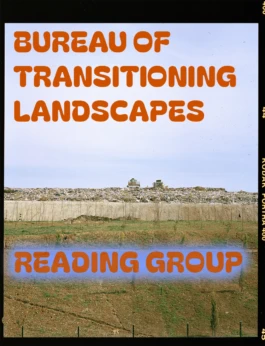READING GROUP
17.4.25
18:00 - 20:00
Indefinite Terrains
with Bureau of Transitioning Landscapes
in English // Registration recommended
Content Notes / Sensory Stimuli
Photo von Kim Bode
Landscapes hold histories of extraction, displacement, and colonialism, but also resistance, memory, and alternative futures. Bureau of Transitioning Landscapes is forming a reading group to critically examine landscapes as sites of struggle, relation, and transformation. Through queer ecologies, anti-colonial, and anti-capitalist perspectives, we will explore landscapes as dynamic entities rather than passive backdrops.

Open to artists, researchers, and anyone curious, this reading group invites collective engagement with texts and practices that challenge extractivist, capitalist, and heteronormative frames. No formal expertise is required – just curiosity, care, and a commitment to learning and unlearning. If you're curious and open to exploring these ideas together, feel free to send an email with a few lines about you or your interest to desk[at|bureau-of-transitioning-landscapes[dot]net to get involved.
The group will meet on:
April 10th (18:30-20:00) – First meeting: [Online/Digital]
We'll gather online for an introductory session where we can meet, share our interests, and discuss the topics we’d like to explore together. This will be informal and open conversation to lay the groundwork for the group and upcoming sessions.
April 17th (18:00-20:00) – Second Meeting: [Offline/Analog]: In the framework of the exhibition soft gardens (Berlin)
This session will take place in person at the soft gardens exhibition in Berlin. The proposed reading for this session is Indefinite Terrains by Polly Stanton, which examines landscapes as ever-changing, shaped by histories of power and memory. In the context of the exhibition, we’ll discuss how these themes manifest in both the reading and the space itself.
May 15th (18:00-20:00) – Digital/Online meeting: Topics to be determined
Our third session will be digital again, and the topics we explore will be chosen collectively based on the group’s interests and participation.
[…]
READING GROUP
17.4.25
18:00 - 20:00
Indefinite Terrains
with Bureau of Transitioning Landscapes
in English // Registration recommended
Content Notes / Sensory Stimuli
Landscapes hold histories of extraction, displacement, and colonialism, but also resistance, memory, and alternative futures. Bureau of Transitioning Landscapes is forming a reading group to critically examine landscapes as sites of struggle, relation, and transformation. Through queer ecologies, anti-colonial, and anti-capitalist perspectives, we will explore landscapes as dynamic entities rather than passive backdrops.

Photo von Kim Bode
Open to artists, researchers, and anyone curious, this reading group invites collective engagement with texts and practices that challenge extractivist, capitalist, and heteronormative frames. No formal expertise is required – just curiosity, care, and a commitment to learning and unlearning. If you're curious and open to exploring these ideas together, feel free to send an email with a few lines about you or your interest to desk[at|bureau-of-transitioning-landscapes[dot]net to get involved.
The group will meet on:
April 10th – First meeting: [Online/Digital]
We'll gather online for an introductory session where we can meet, share our interests, and discuss the topics we’d like to explore together. This will be informal and open conversation to lay the groundwork for the group and upcoming sessions.
April 17th – Second Meeting: [Offline/Analog]: In the framework of the exhibition soft gardens (Berlin)
This session will take place in person at the soft gardens exhibition in Berlin. The proposed reading for this session is Indefinite Terrains by Polly Stanton, which examines landscapes as ever-changing, shaped by histories of power and memory. In the context of the exhibition, we’ll discuss how these themes manifest in both the reading and the space itself.
May 15th – Digital/Online meeting: Topics to be determined
Our third session will be digital again, and the topics we explore will be chosen collectively based on the group’s interests and participation.
[…]